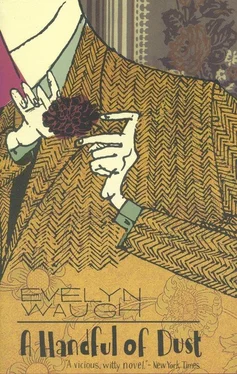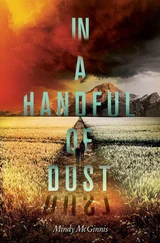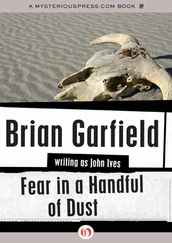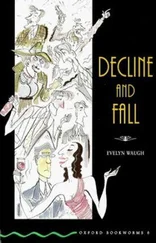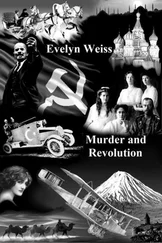Evelyn Waugh - A Handful Of Dust
Здесь есть возможность читать онлайн «Evelyn Waugh - A Handful Of Dust» весь текст электронной книги совершенно бесплатно (целиком полную версию без сокращений). В некоторых случаях можно слушать аудио, скачать через торрент в формате fb2 и присутствует краткое содержание. Жанр: Классическая проза, на английском языке. Описание произведения, (предисловие) а так же отзывы посетителей доступны на портале библиотеки ЛибКат.
- Название:A Handful Of Dust
- Автор:
- Жанр:
- Год:неизвестен
- ISBN:нет данных
- Рейтинг книги:3 / 5. Голосов: 1
-
Избранное:Добавить в избранное
- Отзывы:
-
Ваша оценка:
- 60
- 1
- 2
- 3
- 4
- 5
A Handful Of Dust: краткое содержание, описание и аннотация
Предлагаем к чтению аннотацию, описание, краткое содержание или предисловие (зависит от того, что написал сам автор книги «A Handful Of Dust»). Если вы не нашли необходимую информацию о книге — напишите в комментариях, мы постараемся отыскать её.
It tells of Brenda, Tony and their friends — a wonderfully congenial group who live by a unique set of social standards. According to their rules, any sin is acceptable provided it is carried off in good taste.
A Handful Of Dust — читать онлайн бесплатно полную книгу (весь текст) целиком
Ниже представлен текст книги, разбитый по страницам. Система сохранения места последней прочитанной страницы, позволяет с удобством читать онлайн бесплатно книгу «A Handful Of Dust», без необходимости каждый раз заново искать на чём Вы остановились. Поставьте закладку, и сможете в любой момент перейти на страницу, на которой закончили чтение.
Интервал:
Закладка:
Dr. Messinger, though quite young, was bearded, and Tony knew few young men with beards. He was also very small, very sunburned and prematurely bald; the ruddy, brown of his face and hands ended abruptly along the line of his forehead, which rose in a pale dome; he wore steel-rimmed spectacles and there was something about his blue serge suit which suggested that the wearer found it uncomfortable.
Tony admitted that he was considering taking a cruise.
“I am going away shortly,” said Dr. Messinger, “to Brazil. At least it may be Brazil or Dutch Guiana. One cannot tell. The frontier has never been demarcated. I ought to have started last week only my plans were upset. Do you by any chance know a Nicaraguan calling himself alternately Ponsonby and Fitz Clarence?”
“No, I don't think I do.”
“You are fortunate. That man has just robbed me of two hundred pounds and some machine guns.”
“Machine guns?”
“Yes, I travel with one or two, mostly for show you know, or for trade, and they are not easy to buy nowadays. Have you ever tried?”
“No.”
“Well you can take it from me that it's not easy. You can't just walk into a shop and order machine guns.”
“No, I suppose not.”
“Still at a pinch I can do without them. But I can't do without the two hundred pounds.”
Tony had open on his knee a photograph of the harbour at Agadir. Dr. Messinger looked over his shoulder at it. “Ah yes,” he said, “interesting little place. I expect you know Zingerman there?”
“No, I've not been there yet.”
“You'd like him — a very straight fellow. He used to do quite a lot, selling ammunition to the Atlas caids before the pacification. Of course it was easy money with the capitulations, but he did it better than most of them. I believe he's running a restaurant now in Mogador.” Then he continued dreamily, “The pity is I can't let the R.G.S. in on this expedition. I've got to find the money privately.”
It was one o'clock and the room was beginning to fill up; an Egyptologist was exhibiting a handkerchief-ful of scarabs to the editor of a church weekly.
“We'd better go up and lunch,” said Dr. Messinger. Tony had not intended to lunch at the Greville but there was something compelling about the invitation; moreover, he had no other engagement.
Dr. Messinger lunched off apples and a rice pudding. (“I have to be very careful what I eat,” he said.) Tony ate cold steak and kidney pie. They sat at a window in the big dining room upstairs. The places round them were soon filled with members, who even carried the tradition of general conversation so far as to lean back in their chairs and chat over their shoulders from table to table — a practice which greatly hindered the already imperfect service. But Tony remained oblivious to all that was said, absorbed in what Dr. Messinger was telling him.
“… You see there has been a continuous tradition about the City since the first explorers of the sixteenth century. It has been variously allocated, sometimes down in Matto Grosso, sometimes on the upper Orinoco in what is now Venezuela. I myself used to think it lay somewhere on the Uraricuera. I was out there last year and it was then that I established contact with the Pie-wie Indians; no white man had ever visited them and got out alive. And it was from the Pie-wies that I learned where to look. None of them had ever visited the City, of course, but they knew about it . Every Indian between Ciudad Bolivar and Para knows about it. But they won't talk. Queer people. But I became blood-brother with a Pie-wie — interesting ceremony. They buried me up to the neck in mud and all the women of the tribe spat on my head. Then we ate a toad and a snake and a beetle and after that I was a blood-brother — well, he told me that the City lies between the head waters of the Courantyne and the Takutu. There's a vast tract of unexplored country there. I've often thought of visiting it.
“I've been looking up the historical side too, and I more or less know how the City got there. It was the result of a migration from Peru at the beginning of the fifteenth century when the Incas were at the height of their power. It is mentioned in all the early Spanish documents as a popular legend. One of the younger princes rebelled and led his people off into the forest. Most of the tribes have a tradition in one form or another of a strange race passing through their territory.”
“But what do you suppose this city will be like?”
“Impossible to say. Every tribe has a different word for it. The Pie-wies call it the `Shining' or `Glittering,' the Arekuna the `Many Watered,' the Patamonas the `Bright Feathered,' the Warau oddly enough, use the same word for it that they use for a kind of aromatic jam they make. Of course one can't tell how a civilization may have developed or degenerated in five hundred years of isolation …”
Before Tony left the Greville that day, he tore up his sheaf of cruise prospectuses, for he had arranged to join Dr. Messinger in his expedition.
“Done much of that kind of thing?”
“No, to tell you the truth it is the first time.”
“Ah. Well I daresay it's more interesting than it sounds,” conceded the genial passenger, “else people wouldn't do it so much.”
The ship, so far as any consideration of comfort had contributed to her design, was planned for the tropics. It was slightly colder in the smoking room than on deck. Tony went to his cabin and retrieved his cap and greatcoat; then he went aft again, to the place where he had sat before dinner. It was a starless night and nothing was visible beyond the small luminous area round the ship, save for a single lighthouse that flashed short-long, short-long, far away on the port bow. The crests of the waves caught the reflection from the promenade deck and shone for a moment before plunging away into the black depths behind. The beagles were awake, whining.
For some days now Tony had been thoughtless about the events of the immediate past. His thoughts were occupied with the City, the Shining, the Many Watered, the Bright Feathered, the Aromatic Jam. He had a clear picture of it in his mind. It was Gothic in character, all vanes and pinnacles, gargoyles, battlements, groining and tracery, pavilions and terraces, a transfigured Hetton, pennons and banners floating on the sweet breeze, everything luminous and translucent; a coral citadel crowning a green hill top sewn with daisies, among groves and streams; a tapestry landscape filled with heraldic and fabulous animals and symmetrical, disproportionate blossom.
The ship tossed and tunnelled through the dark waters towards this radiant sanctuary.
“I wonder if anyone is doing anything about those dogs,” said the genial passenger, arriving at his elbow. “I'll ask the purser tomorrow. We might exercise them a bit. Kind of mournful the way they go on.”
Next day they were in the Atlantic. Ponderous waves rising over murky, opaque depths. Dappled with foam at the crests, like downland where on the high, exposed places, snow has survived the thaw. Lead-grey and slate in the sun, olive, field-blue and khaki like the uniforms of a battlefield; the sky overhead was neutral and steely with swollen clouds scudding across it, affording rare half hours of sunlight. The masts swung slowly across this sky and the bows heaved and wallowed below the horizon. The man who had made friends with Tony paraded the deck with the two beagles. They strained at the end of their chains, sniffing the scuppers; the man lurched behind them unsteadily. He wore a pair of race glasses with which he occasionally surveyed the seas; he offered them to Tony whenever they passed each other.
“Been talking to the wireless operator,” he said. “We ought to pass quite near the Yarmouth Castle at about eleven.”
Читать дальшеИнтервал:
Закладка:
Похожие книги на «A Handful Of Dust»
Представляем Вашему вниманию похожие книги на «A Handful Of Dust» списком для выбора. Мы отобрали схожую по названию и смыслу литературу в надежде предоставить читателям больше вариантов отыскать новые, интересные, ещё непрочитанные произведения.
Обсуждение, отзывы о книге «A Handful Of Dust» и просто собственные мнения читателей. Оставьте ваши комментарии, напишите, что Вы думаете о произведении, его смысле или главных героях. Укажите что конкретно понравилось, а что нет, и почему Вы так считаете.
